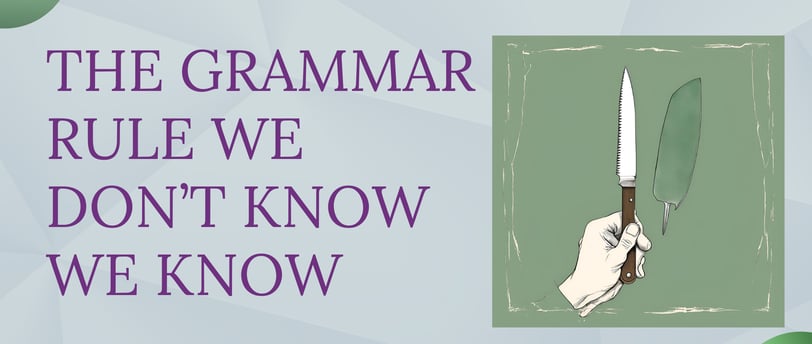The Grammar Rule Native English Speakers Don't Know They Know
There are a number of grammar rules that native speakers may know but don't know that they know. This is how I used one of them as a task in English lessons.
2 min read


When I used to teach English, I was always looking for new materials for lessons. During that time, one day, an amazing article appeared on the BBC’s website (read it here; it's so interesting!) about the grammar rules that native English speakers know without knowing that they know them. The title really piqued my interest because (I am sure a lot of other English teachers and tutors have experienced this) my students often asked me questions about grammar that I didn’t know how to explain, but I knew the rule instinctively.
Based on this article, I created an activity for my advanced students. On a set of cards, I wrote these adjectives: French - whittling - green - little - lovely - old - silver - rectangular. The last card had the word “knife” written on it.
The task was for the students to arrange the adjectives in the right order without any other instructions. Before reading the rest of this blog, stop for a minute and see if you can do it!
This exercise was a bit mischievous on my part because it is not easy to guess these rules. I did not expect the students to guess it all completely, but my students were advanced enough to get at least some of it right. Using the title of "Pretty Little Liars," one student was able to guess the rule that opinion adjectives go in before adjectives of measure and thus knew it would be "lovely little knife." Using a similar tactic, another student, having heard the phrase "little old man," figured out that adjectives of measure go in front of adjectives of age. Knowing those two rules, you can put together "lovely little old knife," but where do all the other adjectives go? I expected all my students to remember the rule of opinion before origin because when talking about tourism, they would have said or heard phrases like "cool French Film" or "beautiful Greek island," but instead, few remembered that rule.
Now for the answer: of course, the noun “knife” goes last. Then, the rule of adjective order goes like this: opinion - measure - age - shape - color - origin - material - use.
Therefore, the correct answer is a "lovely little old rectangular green French silver whittling knife," but you already knew that, right?


Contact
hannahc@thoughtfultranslations.com
P.Iva: 02399890686
